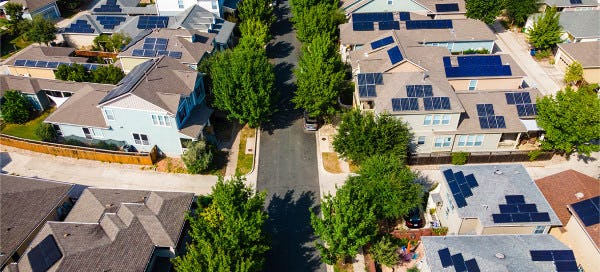As you drive around the neighborhoods in your Texas community, you probably notice that more homes are getting solar panels. Homeowners throughout the state and across the nation are turning to solar power for a variety of reasons. This option offers greater energy independence, conserves our nonrenewable resources, and helps households save on their energy usage.
Are solar panels worth it for you? The answer to that question will depend on your situation, but most of the time the answer is yes. This guide will help you determine whether a solar power system will benefit your household.
Where in Texas Do You Live?
One of the first things to consider is the type of dwelling in which you live. Several factors concerning your home will help you know if a solar power system will be worth it in Texas.
Are You a Homeowner or Renter?
The first issue to address in asking yourself if installing solar panels will be a worthwhile investment is whether you own your home or not. If you are a homeowner, you can proceed with other issues related to investing in a solar energy system.
If you rent a house or an apartment, this issue becomes a little more tricky. In this case, you'll have to discuss your concerns with the property owner. Keep in mind that the property owner will be the one to save on the installation and startup costs. This may make it worthwhile for them to consider your proposal, and you will still enjoy a lower electric bill from month to month.
Is Your Property Clear?
Another factor to consider is the amount of exposure your exterior property receives when the sun shines. If your home is surrounded by trees, you may not get enough sun exposure necessary for solar systems. That's not to say you won't find solar panels worth it, but you may have to make changes to your property.
You might have to clear away the trees surrounding your home. If you want to station the solar panels on the ground near your home, this will require clearing away more trees. Otherwise, you'll need to clear away enough trees to make sure your roof receives unobstructed sunshine during peak sun hours.
Climate also plays a factor in determining the worth of solar panels, although this is less of an issue in Texas. In northern states, the climate can be prohibitive since the sun shines significantly less in the winter months. However, Texas has a more moderate climate all year round, so this factor shouldn't pose a concern.
The average amount of sunlight that Texas receives per day is 4.8 kWh, the measurement that determines the strength of the sun's rays. While it may be sunny for several hours in the day, only 4.8 of those hours provide sufficient sunlight for your solar power system to collect energy.
How Much Do Solar Panels Cost?
If you are wondering, "Are solar panels worth it in Texas?" one of your primary concerns will be the purchase and installation cost. Before you can begin to calculate this initial investment, you will need to know what type of solar system is best for your home.
What Is Your Monthly Electricity Usage?
You should look at your household's energy usage on each electric bill for the past 12 months. Add these sums together and divide by 12 to get an accurate average of your monthly energy costs. You should also estimate the mean energy consumption for your home in the same manner to determine the size of the solar panel system you'll need to meet your home's needs.
How Many Peak Sunlight Hours Does Your Texas Home Receive?
As previously mentioned, Texas receives 4.8 kWh of sunlight per day, but this is an average for the entire state. You should look more specifically into the amount of usable sunlight your home receives. The easiest way to determine whether you get enough sunshine for a solar panel system is to buy a sun meter from your local gardening store or department store.
Watch the meter several times per day to determine the peak hours of sun exposure on your property. Ideally, you should measure sun exposure throughout a 12-month period to see how sun exposure changes through the seasons. This will help you find out whether solar panels will benefit you all year round.
What Brand of Solar Panel System Will You Choose?
Choosing a type and brand of solar system can come down to a personal choice, but a contractor who sells solar panels in Texas can help you choose. As with any type of product, quality varies from brand to brand. Buying a better quality brand can help you enjoy increased energy independence for a longer period of time.
Have You Looked for Solar Incentives and Discounts?
Are solar panels worth it in Texas? Even if you already have determined that the benefits will be worthwhile, you can add value to your investment by looking for ways to minimize your installation costs. There are plenty of government programs and local solar rebates that will make solar panels worth it in Texas.
The first thing to consider is the federal solar tax credit, which drops down to 22% next year. If you don't take advantage of the federal solar tax credit by the end of next year, you will miss out. Starting in 2024, the government will no longer be offering the incentive.
You can also look for solar companies that offer a payback period or another deal to minimize your solar panel installation costs. You may be able to find manufacturer rebates that will help you save even more on solar systems.
How Many Solar Panels Does Your Home Require?
You will need to know how many solar panels are required for your off-grid solar system before you can determine whether the investment is worthwhile. Fortunately, there is already a specific formula available for you to use to determine this value. This formula will give you a more accurate assessment of your energy needs than most online calculators.
Begin by dividing your average monthly energy usage by the average monthly peak sunlight hours. That number is multiplied by 1,000 and the answer is divided by the power rating of the solar panel you intend to buy.
An example for determining how many solar panels a Texas household might need follows:
The household uses 1,140 kWh per month.
Assuming the home gets the maximum 4.8 kWh of usable energy per day, multiply that by 31 days to arrive at 148.8 peak sun hours per month.
Choose solar panels with a power rating of 400 watts.
Using the previously mentioned formula, you will determine that you'll need 19 solar panels for your home. Also, you can more or less determine how many kwh does a solar panel produce with some useful information, but of course that depends on weather conditions, number of sunny days, number of panels etc.
How Long Before Your Solar System Will Pay for Itself?
When you obtain electricity from the power grid in Texas, you'll be paying on average 11.96 cents per kWh. This is very dependent on market conditions. Using the same energy consumption value from the previous example, your household will pay $136.34 per month for the 1,140 kWh of energy it uses each month.
To power your home with solar panels, you would need a 7.6 kWh system, which would cost approximately $22,496. In Texas, homeowners qualify for a 30% tax credit on the purchase and installation of a new solar system. This drops your initial cost down to $15,748.
When you divide $15,748 by $136.66, you will get 115 months. Divide that number by 12 to arrive at 9.5 years.
The average lifetime of a solar power system is 25 to 30 years. This means you can enjoy free energy for the next 15 to 20 years before you will need to think about replacing your solar power system.
You Can Maximize the Energy Savings on Your Solar Investment
Many homeowners oversize their solar panel systems to help them improve solar panel efficiency. In addition to helping you ensure your home will get enough energy to meet your needs, the larger system will benefit you by providing excess solar energy. There are two things you can do with that extra energy, and both options will save you money on a monthly basis.
The first option is to install a bank of batteries that can save the excess energy your system generates. This will give you backup energy to operate your home in the evenings or on stormy days when the sun is hidden. This option will save you money by eliminating the need to connect to the grid when solar energy isn't available.
The second option is to sell your energy to your retail electric provider. Rhythm offers a solar buyback program. Now that solar power is more widely used, almost every electric company in Texas offers a program that allows solar customers to sell their excess energy. You should contact your energy provider to determine how you would be compensated.
Some power companies offer credit to the customer's account, while others offer more direct compensation. In either case, find out how much you would be compensated. The amount you receive should be close to the amount you pay for energy. If they're offering far less per kWh, you'll probably be better off to save the energy for your household's own usage.
Choosing to Go Solar
Once you consider the factors mentioned in the previous sections, you'll have to make the final decision for yourself. If you find the financial incentives that a solar system offers to be worthwhile, you're ready to begin shopping for your new panels.
Look for a dealership that has experience in handling residential projects to ensure you receive the best possible quality of service.
Choose a company that handles the sale and installation of solar panels for the average homeowner. As someone who has never had solar panels installed, you will likely have questions throughout the process. You should feel comfortable asking questions and feel confident that the contractor will provide knowledgeable answers.
These steps are important not just to go through the successful and positive installation process, but to secure some of the best solar buyback plans, Texas is definitely among those few places where you can find all of that. If you feel happier with the quality of the installation, you'll also feel confident in using the new system. Make sure the installation contractor instructs you on the use of your system.
You should also discuss the care and maintenance of your solar power system. Following those instructions will help you comply with the manufacturer's warranty conditions. Proper care will also help you extend the life of the system.
Find the Solar System Plan That's Right for You
If you're ready to explore your solar energy options, visit Rhythm online. You'll be able to review our renewable energy plans on our website. When you're ready to discuss your solar power options, one of our representatives will be happy to assist you.




